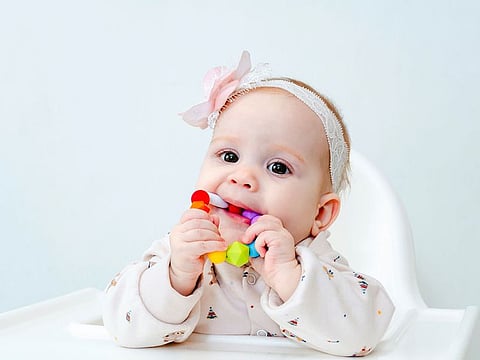How to solve your baby’s teething troubles
Most kids have a set of 20 teeth by the time they're three years old

A pretty big milestone for any baby is the growing of teeth. Unfortunately, there may be some pain involved. While some babies may not exhibit signs of annoyance where a new tooth is concerned, others may find themselves nagged by the itch. We asked UAE-based dentist Marcela Barreto about how to catch the first signs of teething and how to help alleviate any ache.
Typically, at what age does a child grow teeth?
“Teething is a part of your baby’s development that, although timing varies, starts between four to seven months,” says Barreto.
Did you know?
Babies' teeth begin to develop before they are born, but in most cases don't come through until they're between 6 and 12 months old. Most children have a full set of 20 milk or baby teeth by the time they're three years old. When they reach five or six, these teeth will start to fall out, making way for adult teeth. Source: NHS, UK
What are some signs of teething?
The most common symptoms, she explains, are:
How can you reduce discomfort?
Barreto says teething can usually be handled at home, here are some evidence based treatments to reduce your baby’s discomfort:
What should you not do?
When should I start brushing my baby’s teeth?
“A child should brush with a smear amount of toothpaste in the morning and at night. We should start flossing as soon as two teeth establish contact, usually between one to three years of age,” suggested Dr Enas Alkhadra, Specialist Paediatric Dentist at Dubai-based Dental Studio in an earlier interview with Gulf News.
When is it time to contact a doctor for help?
“Contact the doctor if your baby seems too uncomfortable or if there are other symptoms such as fever, diarrhea, runny nose or inconsolable crying,” says Barreto.
Have a parenting question you want answered? Write to us at parenting@gulfnews.com



